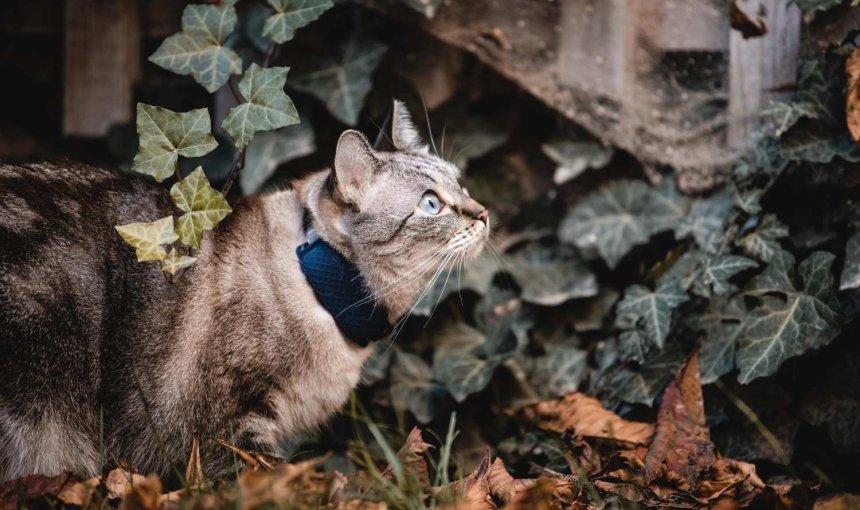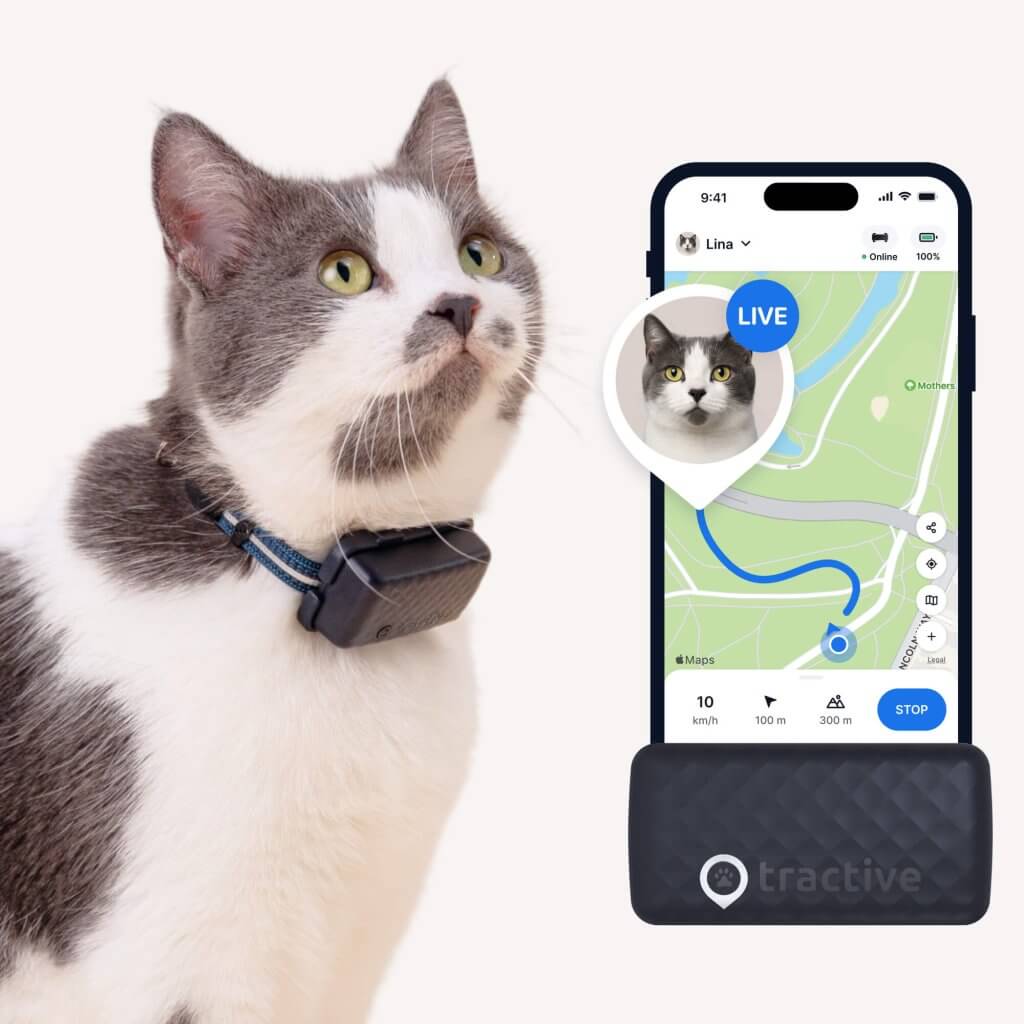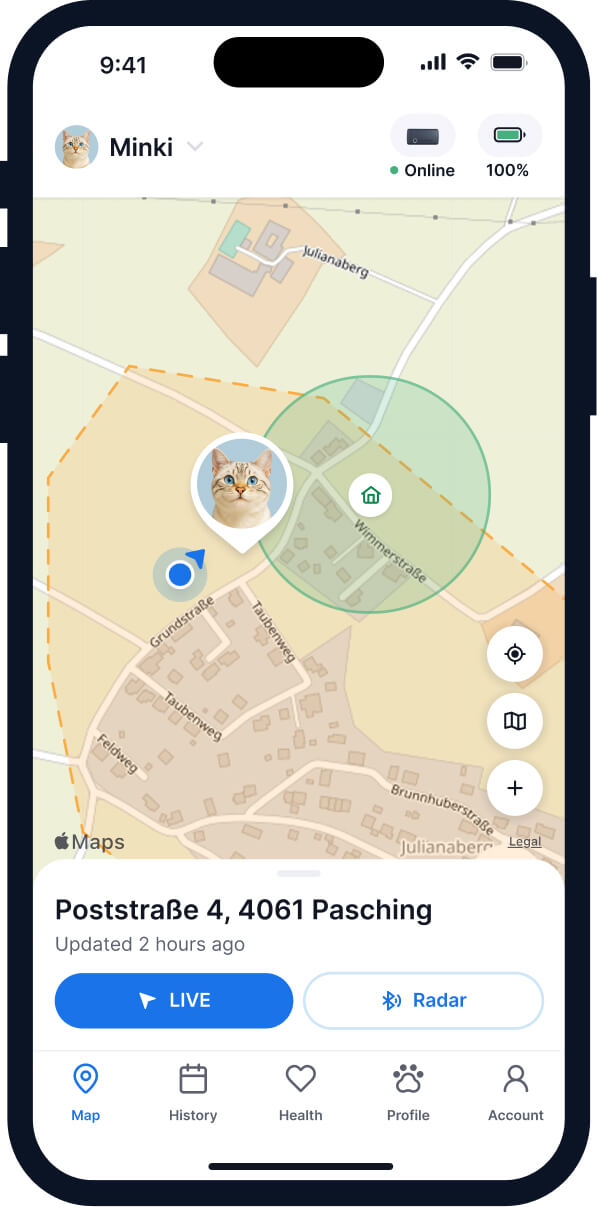Why Do Cats Run Away? 10 Reasons & How To Stop ‘Em
Boredom, curiosity, stress, instincts - there's no end to reasons why cats run away. So here are 10 of them & how you can best keep your wandering buddy safe and sound by following their every step.

Why do cats run away? You feed them, play with them, offer them nothing but a loving home – and you’re still likely to deal with your cat running away at some point or the other. So we’re going to cover the main 10 reasons why – plus what you can do to prevent your cat from making an escape attempt the next time. (Like following their every step in real-time.)

Find out where your cat spends their time.
Read more10 reasons why cats run away
1. Reproductive instinct
The first reason why cats run away is their reproductive instinct, both in female cats in heat as well as unneutered male cats. As long as you have a cat that hasn’t been fixed, it’s more likely to spend its time outdoors. And when they do, there’s no fence high enough to stand in their way. So consider getting yours spayed or neutered to reduce their mating drive.
2. Stress
Stress is another common reason why cats run away. Cats are creatures of habit – they don’t like changes in the household or to their routine. Which might include moving houses, welcoming home a new pet or family member, home renovations, or even just loud noises. All of these things and more can cause stress and anxiety in your kitty and may cause them to seek refuge elsewhere.
3. Hunting instinct
Regardless of how well-fed your cat is, they will most likely enjoy a good hunt. It’s just part of their cat-nature. So don’t be surprised if your outdoor cat roams away from home on the hunt for some irresistible prey.
Read more: Cat Hunting Behavior: Why Does My Cat Hunt?
💡 As an emergency measure, a GPS tracker can help you map out your cat’s territory – including their favorite hunting spots. So you’re that much better prepared for another “missing cat” situation.

Track your cat wherever they go
See where they are in real-time, no matter how far they roam. Discover their territory. Get alerted if they go too far. Track activity, sleep, and receive health alerts if your cat’s activity changes. Keep your feline friend healthy and safe.
4. Neglect or abandonment
Feeling neglected or abandoned are two other potential reasons why your cat may not come home. These might be because they’re spending more time at home alone than in your company. Or maybe they’re not getting enough food, water, or anything else that they need to survive and live a good life Likewise, if your home has been neglected or you haven’t been able to give your cat the care they need
Check out our guide on how to care for a new kitten or cat to make sure you’re properly providing for them. And if you have outdoor cats, be sure to provide them with a warm place to stay in winter.
Read more: Outdoor Cat Care In Winter: How To Keep Yours Safe
5. Territory
In general, a cat’s territory is the area where they spend their time – inside your home, backyard, maybe further. Cats are territorial, therefore they may try to defend their territory against other cats in the area. So reason #3 why cats run away is: they’re claiming their kingdom. (And showing other cats who’s boss.)
The downside is that the bigger the cat’s territory, the more likely they are to come into contact with other cats. Neighboring cats may try to claim their territory in your backyard, which could easily cause your own kitty to try and find another safer yard. If your cat feels threatened in their own territory by another cat, they may not be around that much anymore.

6. Fear
Another common reason for a missing cat is, well, a scaredy-cat. If your cat gets scared off by something, their natural fear response may send them into fight, flight, or freeze mode. More often than not, this might end up in a “flight” response, which sends your cat running for the hills – or “freeze”, where your cat hides somewhere nearby but might be too scared to emerge.
7. Cheating on you
Other friendly humans may have taken a liking to your kitty and begun feeding them, or even letting them inside their house regularly. So step one to prevent your neighbors from mistakenly adopting your cat: put a safety collar with an ID tag on your cat. This way, it’s clear that they belong to your family and don’t get mysteriously ‘adopted’.
We’d also recommend getting your cat a microchip ID, which can work like a permanent ID tag for dogs and cats. (Plus, since they get implanted into your cat’s shoulder blades, they’re less likely to fall off like just an ID tag.)
8. Pregnant cat giving birth
It’s typical for pregnant cats to hide. Pregnant cats will often seek out a secluded, private and safe location to bring their kittens into the world. So if you have a stressful household, for example with dogs or children running around, don’t be surprised if your pregnant feline is nowhere to be found.
9. Sickness
Next, another natural cause of cats running away is sickness. When cats are ill, they prefer to go someplace isolated, concealed and quiet to recuperate on their own without any disturbances. And they may decide that the most peaceful spot for them is not on your property.
Read more: How To Tell If Your Cat Is Sick: Signs Your Feline Friend Isn’t Feeling Well
10. Curiosity
Finally, cats often run away just because they are inquisitive creatures who love to explore and follow their curiosities. But while they’re trying to discover new places, either out of distraction or curiosity, many cats get stuck in various narrow places, such as fences, tubs, garages, and even cars! Or they might end up wandering a bit too far from safety when stalking prey.
Where do cats go when they run away?
If your cat suddenly disappears, your mind may race to the worst-case scenario. But take a deep breath. In most cases, runaway cats aren’t actually far from home. They’re hiding. Whether spooked by a loud noise, chased by another animal, or simply feeling curious and adventurous, cats tend to seek out small, quiet, and secure spaces where they can stay out of sight. Some typical hiding spots include:
- Under decks, porches, or stairs
Where they can crouch low and remain undisturbed - Garages and sheds
Especially if doors were briefly left open - In thick shrubbery, hedges, or tall grass
Especially since these offer camouflage and protection - Inside or under cars
Especially around wheel wells or the engine area for warmth - Attics, crawl spaces, or basements
Either in your own home or a neighbor’s - Neighbor’s homes
Or even nearby barns, greenhouses, or even laundry rooms. Curious cats can slip through the smallest of openings!
Indoor cats that escape are particularly vulnerable. Because they’re unfamiliar with the outside world, they usually won’t roam far. Instead, they’ll freeze in fear and hide within a close radius – often no more than a few houses away.
Outdoor cats, on the other hand, might explore a wider area, especially if there’s food, prey, or another cat involved. Unfortunately, this stealthy behavior can make them incredibly hard to find. They may not respond when called and can stay silent for days, especially if they’re scared or injured.
Why do cats run away…and not come back?
When cats run away, it’s often just for a few minutes, hours, or days at a time. Most likely they will return. According to studies, cats usually don’t travel further than a one mile radius of their home. But sometimes, if a missing cat doesn’t return, it could be due to:
- Natural predators
Like cougars, wolves, coyotes, snakes, and birds of prey. - Disease, injury, or even death
From ticks, other cats, toxic plants, or other dangers outdoors. - Animal control
Which means your cat might’ve been mistaken as a stray and picked up by your local animal authorities. - Theft
Especially if your cat is an expensive breed. - Intentional loss
Like if someone that doesn’t wish your cat well decides to abandon them somewhere or even harm them.
How missing cats find their way back home
It’s not all bad news when it comes to cats running away. It turns out, our feline friends may be experts at finding their way back home. Here are some factors which can help your feline friend return home on their own:
- Homing instinct
Or their ability to navigate back to a familiar location through unfamiliar areas. It may have something to do with cats’ keen sensitivity to the Earth’s geomagnetic field, which helps them to figure out their way home.2 Just keep in mind that outdoor cats are more likely to have this ability than indoor cats. - Cats’ sense of direction
Plus their advanced senses of smell, hearing, and vision, which can help them find their way home from miles away. The presence of iron in cats’ ears and skin may act as a natural compass.
How to stop a cat from running off
Luckily, there are many things a cat parent can do to prevent a cat from running away from home. Even if you have the most adventurous outdoor cat, you have options to keep your feline safe and closeby. Here are some of the best tips for stopping a cat from running away:
- Get them fixed
Spay or neuter your cat to prevent them from running off. Many cat parents are able to worry less about their male cat going missing, once they’ve neutered their cat. - Keep your cat inside
Whenever possible, especially during cold months or at high prey activity times, like dawn and dusk. - Create a catio
Aka an outdoor cat enclosure so your cat can enjoy the outdoors without the risk of getting lost. - Microchip your cat and make sure they have ID tags
So others people will know that your cat already has a family. - Keep your cat busy at home
With healthy activities & play to prevent them from wandering off out of boredom - Limit your cat’s roaming space by setting up a Tractive GPS Virtual Fence
You’ll be notified if your cat crosses the boundary, and you can bring them inside. - Minimize possible escape routes by securing your home, catio, or backyard to make it cat-proof.
- Train kitty to come home using positive reinforcement.
- Be mindful of your cat during stressful changes at home – and give them the extra care they need.
- Provide them with everything they need to thrive at home (food, water, toys, activity, love and healthy stimulation).
- Use a harness and leash on walks with your cat outside.
Where a cat GPS tracker can step in
Strapped to your cat’s collar or harness, a cat GPS tracker can be a potential lifesaver if your cat spends any amount of time outdoors. With LIVE GPS tracking, you can follow your cat’s every step in real time -whether they’re across the yard or sneaking through a neighbor’s garden.

If they wander into a shed or get locked in a garage, your cat’s Location History can show you their last known movements, giving you a valuable clue on where to begin your search. Else, with Virtual Fences, you’ll get an immediate escape alert if your cat leaves their designated safe zone – so you can react before they get too far. It’s a simple way to stay connected to your cat, even when they’ve decided to go on an unannounced adventure.
So, while cats might be experts at hide-and-seek, Tractive makes sure you’re always one step ahead.



